
Xiaomi’s XRING 01 Chip: A Decade in the Making and a $14.5 Billion Investment
Xiaomi is making waves with its latest technological leap: the XRING 01, a self-developed mobile chip. This ambitious project, unveiled by CEO Lei Jun, highlights Xiaomi's commitment to building core technology and reducing reliance on industry giants like Qualcomm and MediaTek. But what makes this chip so significant, and what did it cost Xiaomi to bring it to life?
The XRING 01 received its official announcement this week, setting the stage for its release later in May. While initial details were scarce, Lei Jun later elaborated on the immense investment and extensive research behind the SoC. This isn't Xiaomi's first foray into in-house chip development, but the scale and complexity are unprecedented.
According to ITHome, the development of the XRING 01 spanned a staggering 10 years and involved a dedicated team of around 1,000 employees, led by a former Qualcomm senior director reporting directly to Lei Jun. This strategic move underscores Xiaomi's determination to create a competitive alternative in the chip market.

The push for the XRING 01 comes amid intensifying competition in China’s smartphone market. Companies like Huawei and Apple are already leveraging custom-designed chips to enhance user experience and create tightly integrated ecosystems.
The benefits of custom chip design are multifaceted. Xiaomi aims to have greater control over hardware and software integration, allowing for a more optimized and differentiated product. However, this path is not without its challenges. Lei Jun revealed that R&D investments reached 105 billion yuan (approximately $14.5 billion) in the last five years alone, with over $4 billion invested this year. While this figure isn't exclusively for the XRING 01, it indicates the massive financial commitment Xiaomi is making to innovation.
Early reports suggest the XRING 01 is built on TSMC’s 4nm process, utilizing an octa-core setup with a Cortex-X925 core. Benchmarks are looking promising, potentially rivaling the Snapdragon 8 Gen 3 in performance, fueling anticipation within the tech community.
The Xiaomi 15S Pro is rumored to be the first device to feature the XRING 01. This strategic move allows Xiaomi to refresh its lineup and showcase the capabilities of its new chip.
While the XRING 01 represents a significant stride forward, it’s not Xiaomi’s first attempt at creating custom chips. The Surge S1, launched in 2017, demonstrated Xiaomi's initial ambition. Although subsequent plans for the Surge S2 were put on hold, the XRING 01 marks a renewed and more determined effort.
Xiaomi's dedication to in-house chip development underscores its long-term vision and its desire to stand out in a competitive market. The XRING 01 signals a new era for Xiaomi, one where the company has greater control over its hardware and software, driving innovation and delivering unique experiences to its users.
What do you think about Xiaomi's commitment to developing its own chips? Will the XRING 01 give Xiaomi a competitive edge? Share your thoughts in the comments below!